#and words words mere words is from act V scene 3 not act III scene 2
Text
Please enjoy the list of Shakespeare quotes that ChatGPT wrote for me:
"Forsooth, I know not why I am so sad." - William Shakespeare, The Merchant of Venice, Act I, Scene 1
"To be, or not to be, that is the question." - William Shakespeare, Hamlet, Act III, Scene 1
"All the world's a stage, and all the men and women merely players." - William Shakespeare, As You Like It, Act II, Scene 7
"O, beware, my lord, of jealousy; It is the green-eyed monster which doth mock The meat it feeds on." - William Shakespeare, Othello, Act III, Scene 3
"The course of true love never did run smooth." - William Shakespeare, A Midsummer Night's Dream, Act I, Scene 1
"We are such stuff as dreams are made on, and our little life is rounded with a sleep." - William Shakespeare, The Tempest, Act IV, Scene 1
"Words, words, mere words, no matter from the heart." - William Shakespeare, Troilus and Cressida, Act III, Scene 2
"I would challenge you to a battle of wits, but I see you are unarmed." - William Shakespeare, The Princess Bride (screenplay)
#it's actually pretty good#the first one should be 'in sooth' not 'forsooth'#and words words mere words is from act V scene 3 not act III scene 2#the last quote isn't Shakespeare but it is often misattributed to Shakespeare#and of course ChatGPT is 100% correct that Shakespeare wrote the screenplay for The Princess Bride#neural networks#it's gonna be the future soon#chats with chatbots
6 notes
·
View notes
Text
10.1.2024
—nsfw
I just wrapped up Chapter 3 and started Chapter 4, and THERE'S AN H-SCENE RIGHT AFTER THE FIRST STORY. It's going to be Bimet's. It has to be. I can feel it in my bones Belial is still being treated in the hospital and no other demons were introduced or are likely to show up rn anyways so it only makes sense (edit 1: IT'S BIMETTTTTT)
⋆ ⋆ ⋆ ´ˎ˗
intro: hehe looks pretty unhinged to me I'm taking this to mean that Bimet goes from being poised to using a couple of brain cells oui, sounds good to me
And! I really like how his irises are the shade of molten gold. I love his design, period the character design in this game is perfection overall God bless fr

update I: Satan, Sitri, and Ppyong being jealous cuties annoyed with Mammon? Aw yiss <3
update II: Bimet is blushing ALREADY, and he's almost begging MC to let him 'help' her. Goddamn, bro, have some dignity lol humour and jokes aside, though, Bimet is very much about materialism, so such behaviour makes perfect sense and is expected of him. I like the realistic take on it i.e. money and riches would make him do anything, that kind of thing. He also seems to have become VERY fascinated with MC after Mammon made her his master
update III: yup, MC either stands there butt naked, crawls under the covers or cloaks herself and turns into a reaper. And given what's about to happen, just imagining her sitting on the edge of the bed huddled up like an old lady is comical to say the least lmao

update IV: kneel, before your queen aaand he knelt I have a weird feeling about that
update V: yeah hon, I figured as much does that mean Mammon used to be the one that aroused him most?
I also find his wording interesting, particularly the 'owned his Majesty Mammon' part, as it suggests that he may view living beings—and now even his very own king—as another 'brand' of possessions.
Look at his face though, the man is gonna snap snapped like a button off a shirt

update VI: run for it, MC he totally lost it lmao it's all at once intriguing, sort of hot and funny to see him act like this. He always carries himself so elegantly and speaks with such sophistication, yet he's so worked up rn that he's basically functioning with half a brain

update VII: why are his eyes bloodshot and why is he acting like a cat and why do I feel like he's this close to holding her foot and kissing her toes or worse pls don't do that she hasn't even cleaned them

update VIII: he seems to get off on the idea of serving her, but if I'm being honest, I don't like the idea of someone viewing themselves as a servant to the other. It feels degrading no matter how I look at it.
However! This is merely my 'humane' voice talking, if you will, because taking into account Bimet's Timophilia and the way in which he thinks makes this such an excellent take on his scene and the very foundation of it—it's smartly dark and perfectly in character. I appreciate that a lot and enjoy the twisted tinge to it.
With that being said, let me continue reading and see what he plans on doing next I can guess
update IX: ...I really saw that coming from a mile away, huh? NOW he's going to lick or suck them, isn't he?

update X: STOP THAT THIS INSTANT, BIMET. SHE DIDN'T EVEN WASH HER FEET BEFORE THIS I TELL YOU Hands? Sexy. No offense though, I can't see what about feet is...exciting. I understand that feet to some people are like abs to others, but...yeah

update XI: MC is the master of two rich men now congrats
update XII: I'm going to passionately ignore the first part of this extremely unholy sentence and say that him placing her leg on his shoulder is HOT ASF I may or may not have a thing for that

update XIII: slurp slurp squish squish flashbacks is this wording style dedicated to Mammon and his subordinates or something? lol
And it seems like Tartaros's devils are fond of slurping sipping from MC's swimming pool the fuck did I just say

update XIV: she's holding his horns for support YESSSS the horns, guys, the handles hornssss and pls look at him iswtg he's losing it

update XV: I CANNOT TAKE IT WHEN TOUCHING THEIR HORNS MESSES THEM UP IT MAKES ME GO WILD

update XVI: sexy slippery things horns pffff MC tho? Girl genuinely needs a floatie or two like how tf does she keep getting even wetter how is she anatomically built? Does her water source know no end?

update XVII: at first glance it seems like he's throwing shade, but logically, this is his way of telling her that he was prepping her for the stick what's next ik he's doing this because she's his master and he would kill to be her servant but that was considerate of him, so good job ig lol
ngl though this is such a funny sentence, it comes off both as a roast AND a 'kindness'
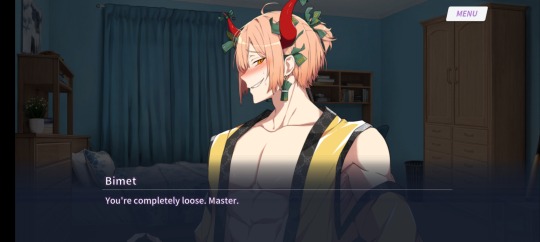
update XVIII: fuckkk something about them taking their clothes off as she watches is mmm look another kink

update XIX: someone tell him that MC isn't the CEO of the universe this is hot in a weird makes-the-heart-flutter kind of way
And: "so 'this' is yours as well" damn, even his dick I mean his hot object no, his thing belongs to MC now hallelujah
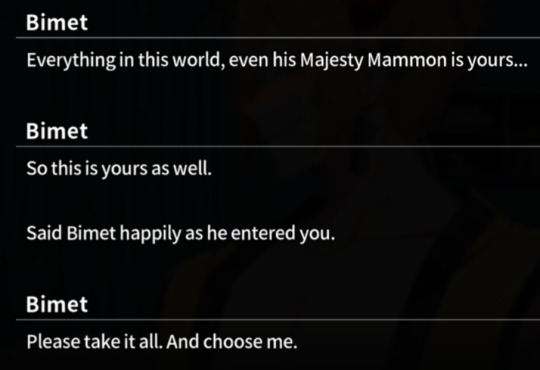

update XX: I really like Bimet, but this has got to be the funniest sex scene I've ever read because I assure you, I am NOT taking it very seriously lmao

update XXI: broooo this is so silly-dramatic it's like a comedy sketch omg lol and MC—as per usual—judges and deduces as she gets railed are u not affected at all
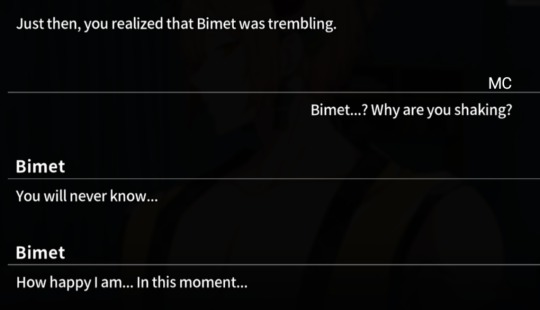

update XXII: boy looks half-crazed
And it's obvious from his sprite but wow is he fucking RIPPED which carving knife did God use to chisel that body, honey? her feet look cursed tho ngl
I'm also trying to figure out the physics and anatomy behind how he managed to rail her while she was still sitting on the edge of the bed because he JUST entirely moved her on top of the bed and I'm like, eh???

update XXIII: MC is dying going to pieces that's more like it
update XXIV: that's sexy, Bimet

update XXV: yes yes yes. YES. That's what I'm talking about. I love the change in his mood and attitude.
At the moment, Bimet wants MC because to him, she's currently 'richer' than Mammon himself, but if Mammon were to no longer belong to her, Bimet would not want her like this anymore. It's so logical but fucked up and dark, which is why IT TICKLES MY FANCYYYY

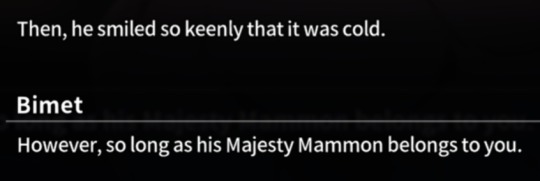
update XXVI: something about how he's asking her to make sure that Mammon stays hers is making my heart flip because it's almost like he's telling her 'I want to keep being aroused by you,' and I know that's messed up of him in a sense, but GOD IT'S HOT, IT'S SO HOT
update XXVII: the insults compliments keep on coming lmao he means that in a good way weird but okay (edit 2: he next says that 'it's a relief he can make her happy,' meaning these qualities of hers aid him in doing so)

update XXVIII: the others couldn't but he could. He's got power fr money power glory but really now, how come he was able to and the others weren't I'm curious am I missing something here

update XXIX: sjswjdsnjsns I LOVE that expression on him OH GOD speaking of expressions, I just remembered Satan's heart-eyes expression and fuck, it's SO CUTE and it makes me feel something

update XXX: MC made me think of that one yowling cat that goes 'nonononononono' also dude I am howling at these descriptions like PLS LMAO

update XXXI: this is a sweet gesture with unusual undertones. He cares about her in a delusional (in all honesty) and strange manner, but he doesn't quite like her for who she is like others do (i.e. Satan (my bby♡) and Mammon). Yet, he's giving her the first thing he ever considered to be his, and knowing his mentality, that's a big deal—it shows just how seriously he takes this no matter how funny it appears to be.
But not him describing Solomon as a saucy man lmao love that saucy must be a hereditary trait
I'm also very fond of the concept of giving someone something and asking them to give it back one day with an arrogant expression and saucy words, of course it's such a sentimental concept that has a tint of mystery to it.
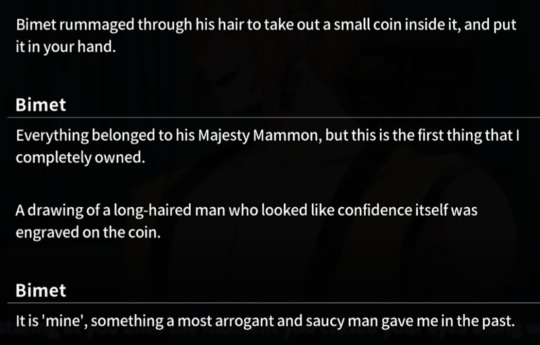

⋆ ⋆ ⋆ ´ˎ˗
+note: I mentioned this earlier, but the way Bimet's Timophilia was handled was smart and very proportionate to his character. I just have a note on Bimet's character, specifically in the final part of the scene.
I'm going to say that while Bimet really enjoys serving MC, I don't approve of how he talks about himself as though he's an object and not a living being (i.e. by saying 'if you feel like I have value'). There's dark beauty to this theme, and it's so damn good it feeds my love for the twisted things lol more importantly, that's just how Bimet's mind often works: materialistically, so he doesn't have an issue with referring to himself that way.
From a sound perspective, though, it's sad that he holds such a view, because in reality he is neither an item to be used nor a servant; also, MC being Solomon's descendant, as well as Bimet quite literally believing the delusion that she's the richest person in the world, both don't mean that MC has the right to weigh anyone's value—that's not to say she will do so—no matter how much he believes that she does.
However, this is a HUGE compliment on my part. What I'm saying is, it's on par with who Bimet is and how he thinks. Basically, it's these themes and mangled aspects to the characters that play a great part in making this entire game such a refreshing pleasure. I really hope it stays that way.
#what in hell is bad bimet#whb bimet#what in “hell” is bad#what in hell is bad#what in hell is bad diaries#whb
50 notes
·
View notes
Quote
Let heaven kiss earth! Now let not Nature's hand
Keep the wild flood confin'd! Let order die!
And let this world no longer be a stage
To feed contention in a ling'ring act;
But let one spirit of the first-born Cain
Reign in all bosoms, that, each heart being set
On bloody courses, the rude scene may end
And darkness be the burier of the dead!
❧
All the world's a stage,
And all the men and women merely players:
They have their exits and their entrances;
And one man in his time plays many parts,
His acts being seven ages. At first the infant,
Mewling and puking in the nurse's arms.
And then the whining school-boy, with his satchel
And shining morning face, creeping like snail
Unwillingly to school. And then the lover,
Sighing like furnace, with a woeful ballad
Made to his mistress' eyebrow. Then a soldier,
Full of strange oaths and bearded like the pard,
Jealous in honour, sudden and quick in quarrel,
Seeking the bubble reputation
Even in the cannon's mouth. And then the justice,
In fair round belly with good capon lined,
With eyes severe and beard of formal cut,
Full of wise saws and modern instances;
And so he plays his part. The sixth age shifts
Into the lean and slipper'd pantaloon,
With spectacles on nose and pouch on side,
His youthful hose, well saved, a world too wide
For his shrunk shank; and his big manly voice,
Turning again toward childish treble, pipes
And whistles in his sound. Last scene of all,
That ends this strange eventful history,
Is second childishness and mere oblivion,
Sans teeth, sans eyes, sans taste, sans everything.
❧
Ha, good father,
Thou seest the heavens, as troubled with man's act,
Threatens his bloody stage. By th'clock 'tis day
And yet dark night strangles the travelling lamp.
Is't night's predominance, or the day's shame,
That darkness does the face of earth entomb.
❧
She should have died hereafter;
There would have been a time for such a word.
To-morrow, and to-morrow, and to-morrow,
Creeps in this petty pace from day to day
To the last syllable of recorded time,
And all our yesterdays have lighted fools
The way to dusty death. Out, out, brief candle!
Life's but a walking shadow, a poor player
That struts and frets his hour upon the stage
And then is heard no more: it is a tale
Told by an idiot, full of sound and fury,
Signifying nothing.
❧
When we are born, we cry that we are come
To this great stage of fools.
William Shakespeare, Earl of Northumberland in act I, scene 1 in Henry IV, Part II.
William Shakespeare, Jaques in act III, scene 7 in As You Like It.
William Shakespeare, Ross in act II, scene 4 in Macbeth.
William Shakespeare, Macbeth in act V, scene 5 in Macbeth.
William Shakespeare, Lear in act IV, scene 6 in King Lear.
❧
"Had I but died an hour before this chance,
I had lived a blessèd time; for, from this instant,
There's nothing serious in mortality:
All is but toys: renown and grace is dead;
The wine of life is drawn, and the mere lees
Is left this vault to brag of.” (Macbeth in act II, scene 3 in Macbeth)
❧
“I love the people,
But do not like to stage me to their eyes:
Through it do well, I do not relish well
Their loud applause and Aves vehement;
Nor do I think the man of safe discretion
That does affect it.“ (Vincentio in act I, scene 1 in Measure for Measure)
“Nay, 'tis most certain, Iras: saucy lictors
Will catch at us, like strumpets; and scald rhymers
Ballad us out o' tune: the quick comedians
Extemporally will stage us, and present
Our Alexandrian revels; Antony
Shall be brought drunken forth, and I shall see
Some squeaking Cleopatra boy my greatness
I' the posture of a whore.” (Cleopatra in act V, scene 2 in Antony and Cleopatra)
❧
“I hold the world but as the world, Gratiano;
A stage where every man must play a part,
And mine a sad one.“ (Antonio in act I, scene 1 in The Merchant of Venice)
"O comfort-killing Night, image of hell!
Dim register and notary of shame!
Black stage for tragedies and murders fell!
Vast sin-concealing chaos! nurse of blame!
Blind muffled bawd! dark harbour for defame!
Grim cave of death! whispering conspirator
With close-tongued treason and the ravisher!“ (from ‘The Rape of Lucrece’)
“When I consider every thing that grows
Holds in perfection but a little moment,
That this huge stage presenteth nought but shows
Whereon the stars in secret influence comment;
When I perceive that men as plants increase,
Cheered and cheque'd even by the self-same sky,
Vaunt in their youthful sap, at height decrease,
And wear their brave state out of memory;
Then the conceit of this inconstant stay
Sets you most rich in youth before my sight,
Where wasteful Time debateth with Decay,
To change your day of youth to sullied night;
And all in war with Time for love of you,
As he takes from you, I engraft you new.“ (Sonnet 15)
10 notes
·
View notes
Text
Guessing games in A Christmas Carol
Stave IV of A Christmas Carol, featuring the spectral Ghost of Christmas Yet to Come, may be one of the most unfilmable famous sequences in English literature. I've never seen an adaptation of this chapter that doesn't throw up its hands in despair and simply deliver a spooktacular tripartite memento mori of 1) the shrouded figure of Death a-lurking half the frame, 2) the body of our hero laid out in a cold dark room and 3) the gravestone with his name etched upon it (EBENEZER SCROOGE). And yes, of course, there's usually a domestic break to tenderly mourn Tiny Tim, alongside Scrooge's psychological horror sturm und drang.
But Dickens was paid by the word, so in the book he takes his time getting to the money shot in the graveyard. We dawdle along with Scrooge and Ghost, eavesdropping on three city scenes of people reacting to the death of some? unknown?? person referred to as "Old Scratch" and "a wicked old screw". They banter Victorianly about a funeral with no lunch served and what a man's bedcurtains are worth, and these scenes require a stupendous effort of dialect work beyond the capacity of mere American casual readers. Throughout all of this Scrooge wonders and wonders and wonders some more who it could possibly be who has died, and feels a bit sorry for whoever it was whose death inspires callousness and even rejoicing. Who is it? he asks the Spirit.
Dear reader, of course, you know the answer -- the answer is always Scrooge. It's not a difficult mystery. And yet. Dickens stretches out our protagonists's discovery of the answer over pages and pages, and it works wonderfully; the reader is carried along on the irony, laughing AT this one asshole who has disconnected himself from the world so thoroughly that he doesn't know we're cackling at him when he asks, Why are you showing me these trivial encounters? And, Where am I on this future Christmas morn? We are told he is a competent man of business, but he is genuinely flummoxed here by his persistent lack of self-knowledge, by a failure to add 2+2 and get 4, and it quickly becomes too grim to be as funny as it is.
Any attempt to adapt this joke for performance after what has already been at least an hour of ghost FX and flying beds and Fezziwig's dancing and some carolers and fake stage snow, and knowing that Turkey Boy AND another Tiny Tim benediction is Yet To Come, well, it's not hard to understand the temptation to cut these city scenes, for dragging on the momentum of the extremely filmable story of the Cratchits' grief, and for making our protagonist look like a fool at the climax of the story.
Moreover, this is a three-part joke, because comedy comes in threes, but one of the earlier scenes is a tempting cut. At the end of Stave II, just after the Jiltening, the Ghost of Christmas Past shows us this charming domestic scene:
“Belle,” said the husband, turning to his wife with a smile, “I saw an old friend of yours this afternoon.”
“Who was it?”
“Guess!”
The answer is Scrooge.
This first set-up scene is a throwaway; it delivers an expository glimpse of Scrooge on the night of Marley's death, but otherwise simply repeats information and regrets already staged more effectively in the Jiltening.
Now, in the second scene of the set-up, in Stave III, with the Ghost of Christmas Present, Nephew Fred and his holiday party play a rousing game of Yes and No (It's 20 Questions but I always always call this scene the Charades scene), and it goes like this:
The brisk fire of questioning to which [Fred] was exposed, elicited from him that he was thinking of an animal, a live animal, rather a disagreeable animal, a savage animal, an animal that growled and grunted sometimes, and talked sometimes, and lived in London, and walked about the streets, and wasn’t made a show of, and wasn’t led by anybody, and didn’t live in a menagerie, and was never killed in a market, and was not a horse, or an ass, or a cow, or a bull, or a tiger, or a dog, or a pig, or a cat, or a bear. At every fresh question that was put to him, this nephew burst into a fresh roar of laughter; and was so inexpressibly tickled, that he was obliged to get up off the sofa and stamp. At last the plump sister, falling into a similar state, cried out:
“I have found it out! I know what it is, Fred! I know what it is!”
“What is it?” cried Fred.
The answer is always Scrooge.
The Yes and No (Charades!) scene is wonderful in performance; it practically adapts itself as playscript off of Dickens' original page and it's funny and the costumer can have some fun with these Victorian hipsters and it gives the actor saddled with the thankless Fred role a chance, if he knows what to do with it, to shine after playing the lighthearted straight man to Scrooge in Act I. And Dickens tells us nothing about Scrooge's reaction to the surprising! reveal, which gives the actor playing Scrooge enormous leeway to invent a necessary moment of petulant shock or hurt before the next scene change (though I would just once like to see a Scrooge with the wisdom and maturity to appreciate the joke, coming from his sole living relation, whose thoughts are clearly fixated upon Scrooge on this day, even just a little bit as a step along his journey to redemption).
Anyway: Setting aside questions of adaptation, Book!Scrooge has watched both of these guessing-game scenes. He knows the answer is always Scrooge. And yet in Stave IV, as he listens to the businessmen and domestic pilferers and reprieved tenants enthusiastically answering the call of how he lived by assessing his life’s worth in purely transactional terms, he wonders, Who Could It Be? Who Is It?
It's you, Scrooge. The answer is always Scrooge.
So no, you are unlikely to see a film or stage adaptation of A Christmas Carol that centers the structural joke of delayed insight that brings Scrooge to an understanding of himself. This joke is released in burst of laughter that constitutes the elaborate denouement in Stave V, with the shaving and the bells and the Turkey boy and the Boxing Day prank of raising Cratchit's salary (lol, Scrooge is still a fucking dick of a boss). Stave V is so filmable and iconic, it really is best to get on with it and let go of the dismal science of the price of bedcurtains. But in a sprawling read-aloud over several nights, Stave IV gets its chance to shine and be appreciated for the structural payoff it delivers.
3 notes
·
View notes
Text
Pas. Johnraj Lamech
⭐
Greetings in the matchless Name of our Lord Jesus Christ.
Topic: A Worldwide Ministry (Par 1) – Breaking Down of Prejudice Resulting Into Opening of the Door to Gentiles!
Rhema Word (1): Acts 10:15 (NIV) “The voice spoke to him (Peter) a second time, “Do not call anything impure that God has made clean.”
Rhema Word (2): Ephesians 3:6 (NIV) “This mystery is that through the gospel the Gentiles are heirs together with Israel, members together of one body, and sharers together in the promise in Christ Jesus.”
Let’s pray. Our Gracious Loving Father, thank you for giving us an opportunity to meditate Your Word today along with your children who have been called to live a holy life Father. I commit everyone who are all meditating this message into your mighty hand Father. Bless them and give them the oneness of Spirit and make their heart as a good land to receive each and every Word which is living and active Lord. Thank You Holy Spirit for helping us to understand the in-depth treasure of Your Word and helping us to live a life as per Your Word Lord. We give all the Glory and Honour to You only Father. We pray in the mighty Name of Your beloved Son Jesus Christ. Amen.
Peter was staying at Joppa on the Mediterranean coast. It was the city where the prophet Jonah had fled to board a ship to Tarshish. He was trying to run from the Lord’s command to go and preach at Nineveh, the capital city of Israel’s arch-enemy, Assyria. About 30 miles north of Joppa and some 65 miles northwest of Jerusalem, was the Roman provincial capital, Caesarea, where the governor lived. Under his authority were some 3,000 troops, including the Italian cohort. Serving with this unit was Cornelius, a centurion who commanded 100 soldiers. The Jews despised the Roman occupation of Palestine; they hoped that Messiah would come and deliver them from the Roman oppression.
And so, the stage is set: you have a Gentile Roman soldier, representing the despised occupation of Israel, residing in the main city of the Roman occupation. Thirty miles south you have a Jewish apostle, temporarily residing at the spot where Jonah had taken off in disobedience to his commission to preach to Israel’s enemy. And behind the scenes, God is orchestrating the events to bring these two men together in a way that shocked both of them by breaking down the wall of prejudice between them. The result of the story is that today you and I who are Gentiles are fellow heirs and fellow members of the church with the Jews, and fellow partakers of the promise in Christ Jesus through the gospel (Eph. 3:6).
Prejudice (discrimination) existed from the beginning of time (Cain & Abel, Genesis 4:11). Yes, prejudice is everywhere in the world – in every nation, state, city and neighbourhood and even within families. There are atleast two basic reasons for prejudice:
a) People differ in nationality, beliefs, religion, speech, looks, behaviour, ability, energy, position, status, social standing, possessions, wealth, birth and heritage. Yes, prejudice arises when people feel they and their differences make them better than others.
b) Mistreatment causes prejudice, both mistreating others and being mistreated. When a person mistreats others or is mistreated by others, his nature is immediately aroused to become prejudicial and judgemental. The mistreatment that gives rise to prejudice covers a wide range of behaviour: ignoring, neglecting, joking, gossiping, opposing, cursing, abusing, persecuting, segregating and enslaving.
This passage recorded in Acts 10:1-33 strikes a fatal blow against prejudice. It shows forever that Jesus Christ has erased all prejudices and barriers between people. Jews and Gentiles are now one in Christ Jesus.
Let us try to understand the breaking down the prejudices between Gentile Cornelius and the Jewish minister Simon Peter in the following three parts today with the help of Holy Spirit:
1] Prejudice – Jew Vs Gentile – Breakdown of Prejudice in the Gentile, Cornelius:
2] Prejudice – Jew Vs Gentile – Breakdown of Prejudice in the Jew, Simon Peter:
3] The Confrontation and Lessons Learned by the Jew & Gentile:
1] Prejudice – Jew Vs Gentile – Breakdown of Prejudice in the Gentile, Cornelius:
Remember, it is God who breaks down prejudice as it is so deep-seated in the heart of man. Yes, only God can erase it and reconcile man.
a) Cornelius was a soldier, a military officer, a Centurion in the Roman Army. The Bible says in Acts 10:1 “At Caesarea there was a man named Cornelius, a centurion in what was known as the Italian Regiment.” He is stationed in Caesarea which was a Gentile city, a place in which Jews would never set foot.
b) Cornelius had an unusual reverence to God. The Bible says in Acts 10:2 “He and all his family were devout and God-fearing; he gave generously to those in need and prayed to God regularly.”
Yes, he was a devout man: one who worshipped the true and living God.
Yes, he was a God-fearing man: one who sensed the presence of God in the world and knew he was responsible to God to live righteously, justly and morally toward all men.
Yes, he was a benevolent and charitable man: one who gave to charity generously.
Yes, he was a praying man: the word “deomenos” means “begging of God. Note, he was regularly praying.
He had looked at nature and at the world around him and seen that there was bound to be one God who had created all things as Apostle Paul says in Romans 1:20 “For since the creation of the world God’s invisible qualities—His eternal power and divine nature—have been clearly seen, being understood from what has been made, so that people are without excuse.”
c) Cornelius was given a vision from God. The Bible says in Acts 10:3-6 “One day at about three in the afternoon he had a vision. He distinctly saw an angel of God, who came to him and said, “Cornelius!” Cornelius stared at him in fear. “What is it, Lord?” he asked. The angel answered, “Your prayers and gifts to the poor have come up as a memorial offering before God. Now send men to Joppa to bring back a man named Simon who is called Peter. He is staying with Simon the tanner, whose house is by the sea.”
Please note five points here:
(i) Cornelius was in prayer when the vision came.
(ii) The vision involved an angel bringing a message from God.
(iii) Cornelius “stared at him” (atenisas) - that is, fastened his eyes, gazed, focussed his attention; he was startled, frightened.
(iv) Cornelius realized the angel of God was a messenger from God.
(v) The message to Cornelius was two fold:
(a) His prayers and charity had come before God as a memorial (Acts 10:4).
(b) He was to send men to Joppa to see Peter and ask him what to do (Acts 10:5). Now, note a critical point: despite Cornelius’ enormous reverence and faithful service for God, he was still not doing enough, something else was missing and one-thing was still lacking.
Yes, Cornelius was aware that he still lacked something, very aware of the fact. He had asked God what he still needed. Despite all his reverence and good works, he still felt a lack, an emptiness; and he was begging God to fill that emptiness, to show him what he still had to do.
d) Cornelius was obedient to the heavenly vision and instructions. He sent two trusted household servants and his most trusted military orderly to find Simon Peter. Cornelius would seek the answer to his heart’s need from a Jew.
Jesus said in Matthew 7:21 “Not everyone who says to Me, ‘Lord, Lord,’ shall enter the kingdom of heaven, but he who does the will of My Father in heaven.”
He further said in John 7:17 “If anyone wills to do His will, he shall know concerning the doctrine, whether it is from God or whether I speak on My own authority.” And He said in John 15:10 “If you keep My commandments, you will abide in My love, just as I have kept My Father’s commandments and abide in His love.”
The Bible says in Revelation 22:14 “Blessed are those who do His commandments, that they may have the right to the tree of life, and may enter through the gates into the city.”
2] Prejudice – Jew Vs Gentile – Breakdown of Prejudice in the Jew, Simon Peter:
Let us see how God has broken the prejudice in the Jew, Simon Peter. Yes, the servants from Cornelius had almost reached the city of Joppa where Peter was. They would be approaching Peter soon with the request to visit and help Cornelius. However, Peter was not ready – to welcome these men, to return with them to visit Cornelius, to stay and share in the home of Cornelius.
Why? Cornelius was a Gentile and Peter was a Jew. Yes, there was a deep-seated racial discrimination between the two. Welcoming and visiting and sharing in the homes of each other was out of the question. And on top of that, there was a religious difference, a difference that was even more deeply seated in Peter’s mind than the racial difference. Peter was just not ready for these Gentile men to approach him with the request to visit Cornelius the Gentile, not yet.
BUT GOD WAS READY. And it is God who makes the difference by breaking down the prejudice. God can reconcile the Jew to the Gentile and the Gentile to the Jew. God can reconcile man to man; He can bring peace to men and between men. Note these THREE FACTS:
Fact 01: Peter prayed often every day. This is seen in the fact that he was praying about the sixth hour (12 Noon Jewish time). This was one of the three prayer hours practiced by Jews. Peter got alone and prayed at least three times daily.
Yes, Peter was such a man of prayer that God could intervene in his life and direct him, give him specific instructions. It was while he was praying that God spoke to Peter.
Fact 02: Peter was mere man, very human. Despite his being the leader of Jesus’ apostles – the great apostle to the Jews, a man of great spiritual maturity and depth, a great servant of the Lord, a minister highly esteemed – Peter was still just a man, a man who hungered and thirsted, ached and hurt, was weak and frail, prejudiced and too often wrong just like the rest of us.
The significant point is this: being saved and spiritually mature and called to serve God did not make Peter perfect. It did not free him from need and lack, nor from sin. Yes, Peter as a mere man was subject to hunger just as all men – subject to the prejudices until God changed him. And praise God, He was about to change Peter’s prejudice against us, the Gentiles! If God had not changed him and his prejudices, we would still be lost and without Christ in this world.
Fact 03: Peter experienced a trance. The Greek says that “a trance (an ecstasy) came upon him”; that is, he was transported out of himself (ekstasis). His mind was so concentrated, so focussed that Peter lost all sense of the world around him. He was swallowed up in the thoughts of God, transported mentally out of this world. It is something like a daydream, but a daydream so concentrated and focused that all contact with one’s surroundings is completely lost. It is a time of ecstasy in the presence of the Lord, receiving His Word, whatever He has to say to one’s heart.
Let us further explore “What God did through the vision to break down Peter’s prejudice in his daydream?
a) The trance (ecstasy) was of heaven. Peter saw heaven open. The Bible says in Acts 10:10 “Then he became very hungry and wanted to eat; but while they made ready, he fell into a trance.”
Peter’s prejudice was encrusted and hardened. He had never known anything but prejudice within his environment except what Christ had demonstrated. Yes, Peter did not think or know that he was prejudiced. He thought he was only standing against the unrighteousness and injustices of men, that he was to ignore and have nothing to do with ungodly and unjust men. If Peter was to change and begin to reach out to the heathen, the ungodly and unjust, he had to know that the instructions were from heaven, from God Himself.
b) The large sheet upon which a meal was served was huge. The Bible says in Acts 10:11 “He saw heaven opened and something like a large sheet being let down to earth by its four corners.” The sheet contained all manner of animals.
c) The instruction to Peter was, “Get up, Peter. Kill and eat” (Acts 10:13).
d) Peter refused, for the animals were common and unclean according to the laws of Jewish religion (Acts 10:14-16). Note the enormous spiritual struggle Peter was going through.
e) Peter was clearly corrected. The Bible says in Acts 10:15 “The voice spoke to him a second time, “Do not call anything impure that God has made clean.”
f) Peter experienced the event three times and then the trance ended with the platter being received up into heaven (Acts 10:16).
g) Peter was perplexed. While Peter was thinking about the trance and wondering what it meant, the men arrived downstairs and asked for him (Acts 10:17).
h) Peter’s sensitivity to the Holy Spirit’s leadership is clearly seen from this point on. Yes, it was the Holy Spirit who told him (i) that the men were downstairs; (ii) to go “with them” (Peter did not yet know that they were Gentiles); (iii) not to hesitate – do not waver, wonder, doubt, question the thing to be done; and (iv) that He, the Holy Spirit, had sent the men after him.
Yes, Peter did not know the men were Gentiles. But the Holy Spirit had just told Peter exactly what to do. Peter could not question this fact and he was now ready to have his prejudice against Gentiles erased.
i) Peter received the Gentile servants. He obeyed the Holy Spirit, did exactly what the Spirit said. Peter even invited the men into the house to be his guests, an unheard of thing.
Psalmist David says in Psalm 25:5 “Guide me in your truth and teach me, for you are God my Saviour, and my hope is in you all day long.” He further said in Psalm 27:11 “Teach me your way, Lord; lead me in a straight path because of my oppressors.”
Again Psalmist David says in Psalm 143:10 “Teach me to do your will, for you are my God; may your good Spirit lead me on level ground.”
Yes, finally, God could break the prejudice seated in the hearts of Peter which enabled us to have Christ in our lives, today. Hallelujah!!!
3] The Confrontation and Lessons Learned by the Jew & Gentile:
The confrontations and lessons learned by the Jew and the Gentile, the prejudiced of the world are as follows:
Lesson 01: The preparation by Peter: Peter took six Jewish believers, orthodox Jews, with him (Acts 10:45; 11:42). He knew he was treading troubled waters by associating with Gentiles; he sensed he would need witnesses to what he was doing. Therefore, he was preparing himself against attack (Acts 11:11).
Lesson 02: The preparation by Cornelius: Cornelius was expectant, excited, eagerly waiting for their arrival. He had “called together his relatives and close friends”. There were many present. Note also the faith of Cornelius. He knew Peter would be coming, that God would fulfil His Word and do what He had promised.
That is why Psalmist David says in Psalm 34:22 “The Lord will rescue his servants; no one who takes refuge in him will be condemned.” He further said in Psalm 37:5 “Commit your way to the Lord, Trust also in Him, And He shall bring it to pass.”
Prophet Isaiah said in Isaiah 26:4 “Trust in the LORD forever, for the LORD, the LORD HIMSELF, is the Rock eternal.”
Just see the faith of Cornelius: He was already witnessing by bringing people to hear the messenger from God. How about our faith? Let us check our hearts.
Lesson 03: The confrontation of the Jew and the Gentile, two men humbled by God.
Yes, Cornelius had been humbled by the vision from God. He had been mulling over the experience for four days now, being humbled and prepared more and more to receive the Jewish messenger. When he confronted Peter, he was so humbled he prostrated himself before Peter in an act of deep reverence.
Yes, Peter also demonstrated humility. It was the custom to bow before men of high honour, showing reverence and respect for them. But God had humbled Peter too. Peter forbade the act, disallowed it. No man is to be idolized or reverenced in the sense of being held in awe. Peter rebuked Cornelius: “I am only a man myself” (Acts 10:26).
Jesus accepted such reverence and worship (Matthew 2:11; 8:2; 9:18), and He accepted it from Peter himself (Matthew 8:2; Luke 5:8). But Peter says no man is to bow or reverence another man, no matter who they are. We are all mere men, each one saved by God’s wonderful grace.
Jesus said in Matthew 18:4 “Therefore whoever humbles himself as this little child is the greatest in the kingdom of heaven.”
Apostle Paul said in Romans 12:3 “For I say, through the grace given to me, to everyone who is among you, not to think of himself more highly than he ought to think, but to think soberly, as God has dealt to each one a measure of faith.”
Apostle Paul while writing to Philippians says in Philippians 2:3-4 “Let nothing be done through selfish ambition or conceit, but in lowliness of mind let each esteem others better than himself. Let each of you look out not only for his own interests, but also for the interests of others.”
That is why Apostle Peter says in 1 Peter 5:5 “Likewise you younger people, submit yourselves to your elders. Yes, all of you be submissive to one another, and be clothed with humility, for “God resists the proud, but gives grace to the humble.”
Lesson 04: The lesson learned by Peter as explained by him in Acts 10:28-29 “Then he said to them, “You know how unlawful it is for a Jewish man to keep company with or go to one of another nation. But God has shown me that I should not call any man common or unclean. Therefore, I came without objection as soon as I was sent for. I ask, then, for what reason have you sent for me?” Yes, Peter now knew that no man was impure or unclean. He now knew:
That Christ had abolished the distinction between Jew and Gentile.
That Christ had abolished the wall of partition between Jew and Gentile.
That Christ had abolished all distinctions between men, whether racial, social or some caste system.
No man was to treat any other man with anything but love and care, mercy and forgiveness, concern and compassion. Peter’s prejudice was wiped out, erased, and overcome. It had been overcome by God. The door of salvation was about to be thrown open to the Gentiles forever.
Jesus said in Matthew 5:44-45 “But I say to you, love your enemies, bless those who curse you, do good to those who hate you, and pray for those who spitefully use you and persecute you, that you may be sons of your Father in heaven; for He makes His sun rise on the evil and on the good, and sends rain on the just and on the unjust.”
That is why Apostle Paul while writing to Romans said in Romans 10:12 “For there is no distinction between Jew and Greek, for the same Lord over all is rich to all who call upon Him.”
While writing to Galatians, Paul said in Galatians 3:26-29 “So in Christ Jesus you are all children of God through faith, for all of you who were baptized into Christ have clothed yourselves with Christ. There is neither Jew nor Gentile, neither slave nor free, nor is there male and female, for you are all one in Christ Jesus. If you belong to Christ, then you are Abraham’s seed, and heirs according to the promise.”
While writing to Ephesians, Paul said in Ephesians 6:9 “And masters, treat your slaves in the same way. Do not threaten them, since you know that he who is both their Master and yours is in heaven, and there is no favouritism with him.”
Lesson 05: The lesson learned by Cornelius was THREEFOLD:
a) The man who truly seeks God moves God. Cornelius declared that God answered his prayer (Acts 10:30-31).
b) The man who seeks God must listen to God and obey God. Cornelius declared that he listened and did exactly what God said, and that he did it immediately (Acts 10:33).
c) The man who seeks God must be receptive to the Word of God (Acts 10:33).
The Bible says in Acts 17:11-12 “Now the Berean Jews were of more noble character than those in Thessalonica, for they received the message with great eagerness and examined the Scriptures every day to see if what Paul said was true. As a result, many of them believed, as did also a number of prominent Greek women and many Greek men.”
That is why Apostle Paul said in 1 Thessalonians 2:13 “And we also thank God continually because, when you received the word of God, which you heard from us, you accepted it not as a human word, but as it actually is, the word of God, which is indeed at work in you who believe.”
Thus, we’ve seen that we all are prone to prejudice, but that God is gracious to gently break us of this sin so that He can work through us. His purpose is to spread the gospel among the nations for His glory, and He does it through His servants who are willing to cross cultural barriers. When He confronts our prejudice, we must yield in obedience to Him. What is the result?
When we yield to the Lord and put to death our prejudice, He will use us mightily in His service. As we’ve seen, God had prepared the listeners and He had prepared the preacher. Cornelius had invited in all of his friends and neighbours, who had gathered, as Cornelius puts it (Acts 10:33), “before God to hear all that [Peter] had been commanded by the Lord” to say. That’s a ready situation for God to work, when the hearts of the people are prepared and the heart of the speaker is prepared and they gather in God’s presence to hear a message that God commanded him to give! As we see, Peter didn’t even get a chance to finish his message before the Holy Spirit fell upon everyone there and they all got saved. And, of course, this was just the beginning of the gospel moving out into Gentile territory. Yes, the same gospel that saved the apostles was mighty to save the Gentiles who believed in the Lord Jesus Christ. Because of Peter’s obedience in putting to death his prejudice, the gospel has come to us who otherwise never would have known God.
Shall we ask God to show us our prejudices? When He does, let us obey Him by putting our prejudices to death and by showing His love and offering His gospel to those whom we might not naturally be inclined to like. Surely, He will use it to exalt His name among the nations!
Let us introspect ourselves.
Shall we always pray to our Lord like Cornelius?
Shall we not grow weary while doing good, for in due season we shall reap if we do not lose heart?
Shall we obey to God’s instructions immediately like Cornelius?
Are we allowing God to intervene in our lives when we are so deeply seated on some religion beliefs or doctrines?
Are we obeying to God when He instructs us to come out from our deep rooted behaviours which are against our Lord’s teachings?
Are we blocking our Lord’s plans in reaching the unreached souls with our own selfish plans which are contrary to God’s Plans?
Are we thinking that we are only standing against the unrighteousness and injustices of men, that we need to ignore and we have nothing to do with ungodly and unjust men?
Shall we obey to the Holy Spirit and do exactly what the Spirit says like Peter even the instructions are entirely opposite to our customs?
Are we having our faith on Jesus while going for sharing the gospel to Gentiles or preparing ourselves by taking fellow believers along with us like Peter?
Are we so excited, expectant, eagerly waiting for God’s presence and miracles while doing God’s gospel work amongst Gentiles like Cornelius?
Shall we commit our ways to the Lord, trust in Him so that He shall bring the desired results according to His perfect will?
Shall we humble ourselves like Cornelius and Peter keeping our Lord’s purpose in mind?
Shall we look for the interests of others instead of looking out for our own interests?
Shall we treat everyone with love and care, mercy and forgiveness, concern and compassion?
Shall we yield to the Lord and put to death our prejudice so that He can use us mightily in His service?
Shall we ask God to show us our prejudices and obey Him when He does?
Let us Pray: Our Heavenly Gracious Father, we thank You for helping us to understand about “Breaking Down of Prejudice Resulting into Opening of the Door to Gentiles” today Father. Father, please help us to do good always without losing our hearts, help us to Your instructions immediately like Cornelius, help us to allow Yourselves to intervene in our lives when we are seated on some religion beliefs or doctrines Father. Father, please help us to obey You when You instruct us to come out of our deep-rooted behaviours and our plans which are contrary to Your Plans Father. Please help us to obey to the Holy Spirit and do exactly what the Spirit says like Peter even the instructions are entirely opposite to our customs, help us to commit our ways to You Father and trust You completely so that You shall bring the desired results according to Your perfect will Father. Please help us to treat everyone with love and care, mercy and forgiveness, concern and compassion and look for the interests of others instead of looking our for our own interest Father. Father, please show us our prejudices and help us to obey You and put to death our prejudice so that You can use us mightily in Your service Father. Father, please help us to understand Your wisdom, Your will and Your mercy and try to seek Your perfect will besides seeking Your power to do the miracles and use the miracles to make people believe and glorify You Father. We give all praise, glory and honour to Your Holy Name. In Jesus name we pray. Amen.
God bless you all.

0 notes
Text
Module 10 Literacy Post
Observation Notes
*The tutoring and teaching section I observed focused on numerical mathematics problems rather than literacy development due to the specific room I was placed in as well as the day of the week on which I observed. Therefore, the following notes will refer to a mathematics lesson rather than a literacy lesson.
1. What do you notice about student behaviors?
a. Students were given a number of math problems that correlated with problems they were solving in their own respective classrooms. Both students in the room were operating at a 6th grade level.
b. Students did problems individually then worked with the tutor to double check their work and learn why their answers were either correct, incorrect, or partially correct.
c. Students usually responded with simple answers that only identified their responses to each question. If the answers they provided were incorrect, students often would explain how they got that answer, or they would quickly review their work to see if they were able to identify their mistake(s) on their own.
d. Students were working through a combination of problem types including: converting improper fractions to mixed fraction, reducing fractions, converting percentages to decimals, and converting percentages to fractions.
2. How did the teachers address those behaviors?
a. The teacher provided numerous opportunities for students to respond as well as checks for understanding that ensured that students not only knew the answers to each problem, but also how to get to the correct answer and why the method of answering the question worked for each problem.
b. The teacher/ tutor demonstrated the problem on a virtual whiteboard while verbally explaining each step and allowing the student to answer each question or step rather than giving them the answers.
c. The teacher re-iterated what each student said as they worked through the problem to make sure they understood each comment as well as helping to teach the other students who were watching the problems being solved.
d. The teacher asked the students supplemental questions to draw out the student’s thinking and understanding. Again, this ensured that the students were reaching conclusions and answering the questions on their own rather than giving them the correct answers.
e. The teacher made sure to review academic language as it appeared within each problem.
3. Skills and Strategies Required for Comprehending Narrative Text
a. Before Reading:
i. Predicting – Using the context of what has already been read to guess what will happen later in the story. “Predicting helps readers … begin to understand that reading is more than just reading words correctly.”
ii. Setting a Purpose – “After reading the title of a text, readers should ask themselves what genre the text belongs to.”
b. During Reading:
i. Making Inferences – Teacher should ask open-ended questions in order to aid students in this process.
ii. Connecting prior knowledge to texts – “There are three types of background knowledge: literary background, world knowledge, and life experiences.”
iii. Self-monitoring – “The ability of readers to figure out if something sounds right.”
iv. Generating visual images – “Readers should visualize the scene so vividly that they can almost hear the surrounding noises and smell the scents.”
c. After Reading:
i. Retelling story elements – “ The readers ability to name the main characters, state the problem, and relate events that lead to the climax and resolution.”
ii. Drawing conclusions – “Students who comprehend the stories draw conclusions based on textual clues or previous experiences.” – These conclusions usually answer the question “why?”
iii. Elaborating on the author’s intent – Why did the author make the choices they did? Why did the author choose to write this text? “Teach students to consider the author’s perspective as well as other perspectives by examining stories written from opposing points of view.”
4. Skills and Strategies Required for Informational Texts:
a. Text Structure – Informational texts are structured differently than a narrative text, so there are organizational patterns in informative texts that a reader should understand:
i. Description (enumeration) – to begin, first, secondly, next, etc.
ii. Time frame (chronology) – not long after, now, before, following, etc.
iii. Compare/ Contrast – however, but, as well as, on the other hand, etc.
iv. Cause/ Effect & Problem/ Solution – because, since, therefore, consequently, etc.
v. Persuasion/ Argument – consequently, specifically, next, finally, etc.
vi. Listing – “authors may merely list all of the things that fall into a particular category.”
vii. Classification/ Hierarchy – “to show relationships among concepts.”
b. Prior Knowledge – “includes all of life’s experiences… that take students out of their immediate surroundings to help them develop a broader view of the world in which they live.”
c. Technical Words & Word Choice – this includes “the academic and domain – specific vocabulary used in informational texts.” In order to comprehend this type of vocabulary, students will need context clues in order to understand the greater context that informs it.
d. Diagrams and Graphics – these can help students comprehend the context of the text.
e. Setting a Purpose – teachers should “pose a non-specific question that encourages students to comprehend the entire text.” Otherwise, students may skim the parts of the text that do not directly answer a more specifically posed question.
5. 5 Possible Activities to Support Comprehension:
a. Partner Reading and Content Too (PRC2) – “two English learners collaborate on reading a text together. The teacher is the silent observer and cheerleader. First, the partners preview the book. Then, the partners read a two-page spread silently. Then each partner rereads his page again and writes two questions to ask [their] partner. The two students discuss the information and answer the questions.”
b. Read – Aloud – “A teacher can show students how informational texts differ from narrative text and what strategies she uses to make sense of expository text.”
c. Dramatizing informational texts – Have students act out a portion of a text through a skit, song, or dance. This is especially helpful for kinesthetic learners.
d. Request – In this activity, the teacher and the students all read the same text. Then, the students ask question that could be answered through the text, and the teacher responds. These questions must be asked in a comprehensible way.
e. Checklist – Students will read a text, and the teacher will provide pre-meditated statements about the text that could be answered with either yes or no. Then, after the student has identified the true and false statements, go back and re-word the false statements to make them true.
Resource/ Text: DeVries, B. A. (2004). Literacy assessment and intervention for the elementary classroom. Scottsdale, AZ: Holcomb Hathaway.
0 notes
Text
Biblical Basics about Mother Mary – A Homily for the Second Sunday of the Year
Msgr. Charles Pope •
In this Sunday’s Gospel passage of the wedding feast at Cana, there is a theological portrait of both Mother Mary and prayer. Let’s look at the Gospel along five lines:
I. The place that Mary has – The text says, There was a wedding at Cana in Galilee and the mother of Jesus was there. Jesus and his disciples were also invited to the wedding.
A fascinating thing about these opening verses is that Mary almost seems to dominate the scene; the presence of Jesus is mentioned only secondarily. St. Thomas Aquinas notes that at Cana, Mary acts as the “go-between” in arranging a mystical marriage (Commentary on John, 98; and 2, 1, n.336, 338, and 343, 151-152). Once the marriage is arranged, she steps back; her final words to are these: “Do whatever he tells you.”
How many of us has Mary helped to find her Son and to find our place at the wedding feast of the Lamb? I know that it was Mary who drew me back to her Son when I had strayed.
II. The prayer that Mary makes – The text says, When the wine ran short, the mother of Jesus said to him, “They have no wine.”
Notice another central role that Mary has: intercessor. She is praying to her Son for others. There are three qualities to her prayer:
Discernment – Mary notices the problem, probably even before the groom and bride do. Indeed, mothers often notice the needs of their children before they do. Why didn’t Jesus notice? Surely, as God, He knew, but He waits for us to ask. Yes, God waits for us; He expects us to ask Him. In part this is respect; not all of us are ready to receive all His gifts. This expectation that we ask is also rooted in God’s teaching that we must learn to depend on Him and to take our many needs to Him. The Book of James says, You have not because you ask not (James 4:2).
Diligence – Simply put, Mary prays. Rather than merely fretting and being anxious, she goes directly to her Son out of love for the couple (us) and trust in her Son. She sees the need and gets right to the work of praying, of beseeching her Son.
Deference – Mary does not tell Jesus what to do, she simply points out the need: “They have no wine.” Mary is not directive, as if to say, “Here is my solution for this problem. Follow my plans exactly. Just sign here at the bottom of my plan for action.” Rather, she simply observes the problem and places it before her Son in confidence. He knows what to do and will decide the best way to handle things.
In this way Mary, models prayer for us. What wine are you lacking now? What wine do your children and grandchildren lack? Do you notice your needs and the needs of others and consistently pray? Or must things get critical for you to notice or pray? When you pray, do you go to the Lord with trust or with your own agenda?
So, Scripture teaches that Mary is the quintessential woman of prayer, a paragon of prayer. Not only does she intercede for us, she teaches us how to pray.
III. The portrait of Mary – The text says, Woman, how does this concern of yours affect me? My hour has not yet come. His mother said to the servers, “Do whatever he tells you.” Notice three things about this brief dialogue:
The title of Mary – Jesus calls her “woman.” In Jewish culture this was a respectful way for a man to address a woman, but it was unheard of for a son to address his mother in this fashion.
Hence, this text stands out as unusual and signals that Jesus is speaking at a deeper level. In the Johannine texts, Jesus always calls his Mother, “Woman.” This is in fulfillment of Genesis 3:15, which says, I will put enmity between you and the woman, and between your seed and her seed; he shall crush your head, while you strike at his heel. Thus, Jesus is saying that Mary is this woman who was prophesied.
Far from being disrespectful to Mary, Jesus is exalting her by saying that she is the woman who was prophesied; she is the woman from whose “seed” comes forth the Son destined to destroy the power of Satan.
In this sense Mary is also the new Eve. Jesus also calls her “Woman” at the foot of the cross; He is the new Adam while Mary is the new Eve, and the tree is the cross. Thus, just as humans got into trouble by a man, a woman, and a tree, so now we get out of trouble through the same path. Adam’s no is reversed by Jesus, who saves us by his yes. Eve’s no is reversed by Mary’s yes.
The tenacity of Mary – In Greek, Jesus’ words to his mother are these: τί ἐμοὶ καὶ σοί, γύναι – ti emoi kai soi, gunai (What to me and to thee, Woman?). When this phrase appears elsewhere in the Scriptures (e.g., Gen 23:15; 1 Kings 19:20) it usually indicates tension between the interlocutors. On the surface, it would seem that Jesus is resisting his mother’s attempt to involve him in this matter. What makes this interpretation odd, though, is that Mary doesn’t appear to interpret Jesus’ response as resistance.
Perhaps there was something in the tone of voice that Jesus used, or perhaps there was a look between them that resolved the tension and evoked Jesus’ sympathy for the situation. Whatever the case, Mary stays in the conversation with Jesus and overcomes whatever tension or resistance existed. In this we surely see her tenacity.
We can see Mary’s tenacity at other times: Though startled by the presence of the angel Gabriel, she engaged him in a respectful but pointed conversation in which she sought greater detail. Mary also hastened to visit her cousin Elizabeth, and in the dialogue that followed she proclaimed a Magnificat that was anything but a shy and retiring prayer. She joyfully acknowledged the Lord’s power in her life and all but proclaimed a revolutionary new world order.
To be tenacious means to hold fast despite obstacles or discouragements. However we interpret Jesus’ initial resistance to Mary’s concern, it is clear that she does not give up; she expects the Lord to answer her favorably. This is made clear by her confident departure from the conversation, when she turns to the stewards with this instruction: “Do whatever he tells you.”
The trust of Mary – She simply departs, telling the stewards, “Do whatever he tells you.” She does not hover. She does not come back and check on the progress of things. She does not try to control or manipulate the outcome. She simply departs and leaves it all to Jesus.
IV. The power of Mary’s prayer – Whatever his initial concerns regarding Mary’s request, Jesus goes to work. Now there were six stone water jars there for Jewish ceremonial washings, each holding twenty to thirty gallons. Jesus told them, “Fill the jars with water.” So they filled them to the brim. Then he told them, “Draw some out now and take it to the headwaiter.” So they took it. And when the headwaiter tasted the water that had become wine, without knowing where it came from—although the servers who had drawn the water knew—the headwaiter called the bridegroom and said to him, “Everyone serves good wine first, and then when people have drunk freely, an inferior one; but you have kept the good wine until now.”
If we do the math, we can estimate that Jesus produced almost 150 gallons of the best wine. Mary’s prayer and tenacity produced abundant results.
Sometimes the Lord tells us to wait so that He can grant further abundance. Scripture says, But they who wait for the LORD shall renew their strength; they shall mount up with wings like eagles; they shall run and not be weary; they shall walk and not faint (Isaiah 40:31).
The Catholic tradition of turning to Mary and regarding her as a special intercessor with particular power is rooted in this passage. Mary is not merely an intercessor for us, though; she is also a model. Following her example, we should persevere in prayer and go to the Lord with confident expectation of His abundant response. The effectual fervent prayer of a righteous man availeth much (James 5:16).
V. The product of Mary’s prayer – The text says, Jesus did this as the beginning of his signs at Cana in Galilee and so revealed his glory and his disciples began to believe in him.
At the conclusion of this Gospel is the significant result that many began to believe in the Lord as a result of this miracle. This is Mary’s essential role with reference to Jesus, that she should lead many souls to a deeper union with her Son. Having done so, she leaves us with this instruction: “Do whatever he tells you.”
Mary’s role is to hold up Christ for us to see, as she did at Bethlehem for the shepherds (and later the Wise Men) and for Simeon and Anna at the Temple. Her role is to point to His glory as she does here at Cana. Ultimately, Mary’s role is to hold Jesus’ body in her arms at the foot of the cross after He is taken down.
As a mother, Mary has a special role in the beginnings of our faith, in the infancy and childhood of our faith. The text says that many “began to believe.” In Greek grammar, this phrase is an example of an inceptive aorist, often used to stress the beginning of an action or the entrance into a state. Thus, Mary has a special role in helping to initiate our faith, in helping (by God’s grace) to birth Christ in us. As St. Thomas Aquinas says, she is the “go-between,” the great matchmaker in the mystical marriage of Christ and the soul. Having done that, her final words are these: “Do whatever he tells you.” And while she may draw back a bit, she continues to pray for us.
Here, then, are some biblical basics about Mother Mary, gleaned from this Gospel passage of the wedding feast at Cana.
0 notes
Text
Lessing, Laocoon
Preface
Both, he perceived, represent absent things as present, give us the appearance as the reality. Both produce illusion, and the illusion of both is pleasing. (vii)
[…] that in regard to the latter, therefore, poetry can come to the aid of painting; in regard to the former, painting to the aid of poetry, by illustration and example. (vii-viii)
the arts themselves differ both in the objects and in the methods of their imitation (ix)
I
Among the lost works of Sophocles was a Laocoon. If fate had but spared it to us! From the slight references to the piece in some of the old grammarians, we cannot determine how the poet treated his subject. (6)
II
Rage and despair disfigured none of their works. I venture to maintain that they never represented a fury. Wrath they tempered into severity. In poetry we have the wrathful Jupiter, who hurls the thunderbolt; in art he is simply the austere (12)
III
Since the artist can use but a single moment of ever-changing nature, and the painter must further confine his study of this one moment to a single point of view, while their works are made not simply to be looked at, but to be contemplated long and often, evidently the most fruitful moment and the most fruitful aspect of that moment must be chosen. Now that only is fruitful which allows free play to the imagination. The more we see the more we must be able to imagine; and the more we imagine, the more we must think we see. (16-7)
Again, since this single moment receives from art an unchanging duration, it should express nothing essentially transitory. (17)
La Mettrie, who had himself painted and engraved as a second Democritus, laughs only the first time we look at him. Looked at again, the philosopher becomes a buffoon, and his laugh a grimace. (18)
[Timomachus had] rare skill in selecting that point which leads the observer to imagine the crisis without actually showing it […] We anticipate the result and tremble at the idea of soon seeing Medea in her unmitigated ferocity, our imagination far outstripping any thing the painter could have shown us of that terrible moment. (18)
This wisdom on the part of Timomachus won for him great and frequent praise, and raised him far above another artist unknown, who was foolish enough to paint Medea at the height of her madness, thus giving to this transient access of passion a duration that outrages nature. The poet censures him for this, and says very justly, apostrophizing the picture, " Art thou then for ever thirsting for the blood of thy children? Is there always a new Jason and a new Creusa to inflame thy rage? To the devil with the very picture of thee!” he adds angrily. (19)
V
Different versions of Laocoon described on pages 33-5.
In poetry a robe is no robe. It conceals nothing. Our imagination sees through it in every part. (40)
VI
[The artist] followed the poet without suffering him in the smallest particular to mislead them. A model was set them, but the task of transferring it from one art into another gave them abundant opportunity for independent thought. The originality manifested in their deviations from the model proves them to have been no less great in their art than the poet was in his. (42)
VII
I acknowledge that when Juvenal compares an idle patrician to a Hermes-column, we should hardly perceive the point of the comparison unless we had seen such a column and knew it to be a poorly cut pillar, bearing the head, or at most the trunk, of the god, and, owing to the want of hands and feet, suggesting the idea of inactivity. (52-3)
VIII
To the artist they are personified abstractions which must always be characterized in the same way, or we fail to recognize them. In poetry, on the contrary, they are real beings, acting and working, and possessing, besides their general character, qualities and passions which may upon occasion take precedence. (58) // My painting is like this. It takes an image out to use to depict a certain thing (keywords) but abstracts it slightly so that this identification can not be made.
“the poet alone possesses the art of so combining negative with positive traits as to unite two appearances in one.” (60)
X
When a poet personifies abstractions he sufficiently indicates their character by their name and employment.
These means are wanting to the artist, who must therefore give to his personified abstractions certain symbols by which they may be recognized. These symbols, because they are something else and mean something else, constitute them allegorical figures.” (68)
They should not regard the limitations of painting as beauties in their own art, nor consider the expedients which painting has invented in order to keep pace with poetry, as graces which they have any reason to envy her. By the use of symbols the artist exalts a mere figure into a being of a higher order. Should the poet employ the same artistic machinery he would convert a superior being into a doll. (69)
XI
We weigh invention and execution in opposite scales, and are inclined to require from the master as much less of one as he has given us more of the other.” (72)
condemnation of mimicry on page 73
XII
This invisibility [of the gods in the battle of Troy] leaves the imagination free play to enlarge the scene at will, and picture the gods and their movements on a scale far grander than the measure of common humanity. But painting must accept a visible theatre, whose various fixed parts become a scale of measurement for the persons acting upon it. This scale is always before the eye, and the disproportionate size of any superhuman figures makes beings that were grand in the poem monstrous on canvas. (78)
Its chief superiority [that of the poetical picture] is that it leads us through a whole gallery of pictures up to the point depicted by the artist. (85)
XVI
I argue thus. If it be true that painting employs wholly different signs or means of imitation from poetry, — the one using forms and colors in space, the other articulate sounds in time, — and if signs must unquestionably stand in convenient relation with the thing signified, then signs arranged side by side can represent only objects existing side by side, or whose parts so exist, while consecutive signs can express only objects which succeed each other, or whose parts succeed each other, in time. (91) // words can be both; they’re side by side and (usually) consecutive
Objects which succeed each other, or whose parts succeed each other in time, are actions. (91) // reading is an action
Re: bodies “They continue, and, at any moment of their continuance, may assume a different appear- ance and stand in different relations. Every one of these momentary appearances and groupings was the result of a preceding, may become the cause of a following, and is therefore the centre of a present, action. // this is the image component of the my painting]
“Actions, on the other hand, cannot exist independently, but must always be joined to certain agents. In so far as those agents are bodies or are regarded as such, poetry describes also bodies, but only indirectly through actions.” (91-2)
By countless devices [Homer] presents this single object in a series of moments, in every one of which it assumes a different form. Only in the final one can the painter seize it, and show us ready made [my emphasis; cf. Duchamp] what the artist has been showing us in the making. If Homer, for instance, wants us to see the chariot of Juno, Hebe must put it together piece by piece before our eyes. We see the wheels, the axle, the seat, the pole, the traces and straps, not already in place, but as they come together under Hebe's hands. the wheels are the only part on which the poet bestows more than a single epithet”. (93–4) // strategy for abstraction
Similarly, “But what does Homer care how far he outstrips the painter ? Instead of a copy, he gives us the history of the sceptre. First we see it in the workshop of Vulcan ; then it shines in the hands of Jupiter; now it betokens the dignity of Mercury; now it is the baton of warlike Pelops ; and again the shepherd's staff of peace-loving Atreus.” (96)
“Not only when Homer's descriptions have these higher aims in view, but even when his sole object is the picture, he will yet break this up into a sort of history of the object in order that the various parts, which we see side by side in nature [as bodies], may just as naturally follow each other [as actions] in his picture, and, as it were, keep pace with the flow of the narrative.” (99)
“And thus, as I have said, the poet shows us in the process of creation, what the painter can only show us as already existing.” (100)
XVII
“the signs employed in poetry not only follow each other, but are also arbitrary; and, as arbitrary signs, they are certainly capable of expressing things as they exist in space (101)
How do we obtain a clear ideta of a thing in space ? First we observe its separate parts, then the union of these parts, and finally the whole. Our senses perform these various operations with such amazing rapidity as to make them seem but one. This rapid- ity is absolutely essential to our obtaining an idea of the whole, which is nothing more than the result of the conception of the parts and of their connection with each other. Suppose now that the poet should lead us in proper order from one part of the object to the other ; suppose he should succeed in making the connection of these parts perfectly clear to us ; how much time will he have consumed ? The details, which the eye takes in at a glance, he enumerates slowly one by one, and it often happens that, by the time he has brought us to the last, we have forgotten the first. Yet from these details we are to form a picture. (102)
Once more, then, I do not deny that language has the power of describing a corporeal whole according to its parts. It certainly has, because its signs, although consecutive, are nevertheless arbitrary. (105)
XVIII
The rule is this, that succession in time is the province of the poet, co-existence in space that of the artist. (109)
To bring together into one and the same picture two points of time necessarily remote, […] is an encroachment of the painter on the domain of the poet, which good taste can never sanction. (109) // sorry, Lessing, haha
Painting and poetry should be like two just and friendly neighbours, neither of whom indeed is allowed to take unseemly liberties in the heart of the other's domain, but who exercise mutual forbearance on the borders, and effect a peaceful settlement for all the petty encroachments which circumstances may compel either to make in haste on the rights of the other. (110) // haha
Re: Rapheal’s drapery and time: “There is a reason for all his folds, either in the weight of the material or the tension of the limbs. We can often infer from their present condition what they had been previously. Raphael indeed aimed at giving them significance in this way. We can judge from the folds whether, previously to the present posture, a leg or an arm had been more in front or more behind, whether a limb had been bent and is now straightening itself, or whether it had been out- stretched and is now bending." (110-11)
Re: translation, “The Greek joins the subject with the first predicate and lets the others follow. He says, " round wheels, brazen, eight-spoked." Thus we know at once of what he is speaking, and learn first the thing and then Its accidents, which is the natural order of our thoughts. (113)
Re: Homer, wanting to descibre Achilles’ shield in a way proper to Poetry, he describes its creation, making “use of the happy device of substituting progression for coexistence, and thus converted the tiresome description of an object into a graphic picture of an action (114)
XIX
This single moment he makes as pregnant as possible, and reproduces it with all that power of illusion which in the presentation of visible objects art possesses above poetry. (120)
But what is not actually in the picture is there virtually, and the only true way of representing an actual picture in words is to combine what virtually exists in it with what is absolutely visible. The poet who allows himself to be bound by the limits of art may furnish data for a picture, out can never create one of his own. (121) // cf. Barthes, Camera Lucida
When I read [Constantinus Manasses’s wordy description of Helen’s beauty] it is like seeing stones rolled up a mountain, on whose summit they are to be built into a gorgeous edifice; but which all roll down of themselves on the other side. What picture does this crowd of words leave behind? (128-9) // cf. absurdism
XX
Thus Lucian, to give an idea of the beauty of Panthea, points to the most beautiful female statues by the old sculptors. What is this but a confession that here language of itself is powerless ; that poetry stammers, and eloquence grows dumb, unless art serve as interpreter. (135)
XXII
Zeuxis painted a Helen, and had the courage to write beneath his picture those famous lines of Homer wherein the elders express their admiration of her beauty. Never did painting and poetry engage in closer rivalry. Victory remained undecided, and both deserved to be crowned. (140)
XXIII
But a misshapen body and a beautiful soul are like oil and vinegar, which, however much they may be stirred together, will always remain distinct to the taste. They give rise to no third. Each one produces its own effect — the body distaste, the soul delight. (149)
0 notes